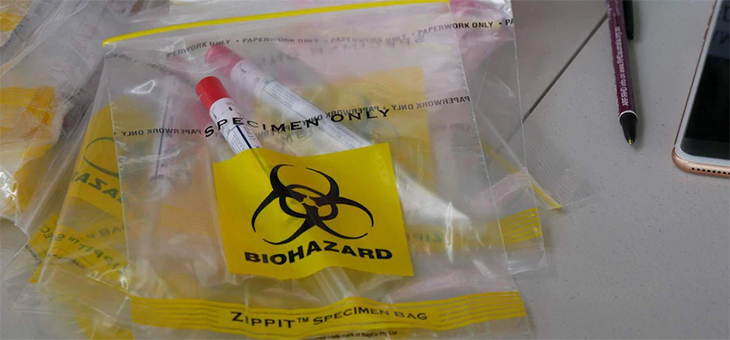Federal and state governments in Australia have been accused by some medical and industry experts of ignoring rapid testing technology that could help the nation recover from COVID-19 clusters faster.
They say rapid COVID-19 screening tests – which take minutes to get results – are much cheaper than lengthy pathology tests and could see tourism, travel and major events open up sooner.
Known as Rapid Antigen Tests (RATs), the tests are more sensitive to picking up the virus from people who are not showing symptoms.
World Health Authority (WHO) adviser and Australian expert Professor Marylouise McLaws said it was difficult for experts to understand why rapid tests were not being used as well as lab-based PCR [polymerase chain reaction] tests.
“Many of us are very frustrated, that there’s these very accurate tests for identifying you as negative and not being used and added to the multiple layers to keep the community safe and allow people to move around and enjoy mass gathering,” Professor McLaws said.
In a statement, a spokeswoman for the federal Health Department said “PCR testing remains the gold standard, and in Australia, testing turnaround times are generally within 24 hours, which is sufficient in the context of other existing public health measures”.
Professor McLaws said it was not being suggested that the rapid tests should be used instead of pathology tests, rather as an additional measure.
“We’re saying PCR should never be removed from the equation, but you add these [rapid] tests because they’re so good while your viral load is low and you’re asymptomatic, that it would open up [the community],” she said.
Professor McLaws said there were many options already approved in Australia by the Therapeutic Goods Administration (TGA).
“Because we’ve got 11 – last I looked – that were approved by the TGA and they are exceptionally good for augmenting with PCR,” Professor McLaws said.
“Most of them take 15 minutes, maximum 30 minutes, to take the swab, put it in the cassette and read the cassette – so very fast.
“You have of course, rapid PCR tests, but they take four to six hours … [but RATs are] so much cheaper and so much faster than a PCR.”
Australian companies frustrated
John Kelly, the CEO of Australian company Atomo, developed a TGA-approved rapid test for COVID-19.
He said the medical technology industry in Australia did not have the ear of federal politicians in the way the pathology industry does.
“I think there’s been only one voice at the table, and that voice is the pathology industry, in the lab services in hospitals and private sector and they obviously want to continue to do lab-based testing,” Mr Kelly said.
“I think there’s been some resistance at the policy level to the adoption of rapid testing.”
A spokeswoman for the federal Health Department confirmed the government was, in a large part, taking its advice from the pathology or laboratory industry.
In a statement, it said Australia was taking a strong approach “based on the latest and best medical advice from the Australian Health Protection Principal Committee (AHPPC) and its expert standing committees, including the Public Health Laboratory Network (PHLN)”.
“That’s unfortunate,” Mr Kelly said.
“But rapid testing has been proven overseas to be a lot more cost effective and a lot more useful in channels where an immediate result is, is needed – that’s things like travel and major events.” LIVE UPDATES: Read our blog for the latest news on the COVID-19 pandemic.
Screening post-vaccination
Professor McLaws said even with mass vaccinations, there would be some people who would not be protected and could be infectious.
She said Rapid Antigen Testing could help screen people who had been vaccinated that might be carrying the virus.
“With AstraZeneca, there may be about 18 per cent of us that won’t [get an immune response],” she said.
“So the Rapid Antigen Test is a great way of ensuring … that we’re not one of those people that never quite got that antibody response and we’re not carrying a silent COVID with us into the next state or territory.”
Professor McLaws said vaccinated travellers who had been to hotspots could have quick screening tests before boarding flights to Australia.
Despite listing by the TGA, a spokeswoman for the federal Health Department said new devices needed careful consideration.
“Listing on the ARTG [Australian Register of Therapeutic Goods] does not automatically mean these devices are appropriate for widespread use in Australia, particularly in the context of low disease prevalence,” the spokeswoman said.
In a statement the federal Health Department spokeswoman added the “use of rapid antigen tests is a matter for the public health units in each state and territory, in line with the PHLN [Public Health Library Network] and CDNA [Communicable Diseases Network Australia] joint statement”.
“The statement advises that rapid antigen tests should only be used for public health investigation purposes in certain contexts and situations under medical supervision,” the spokeswoman said.
Professor McLaws said some of the RATs had proven almost as good as lab tests.
“These [RAT] tests have been validated against the PCR [test] when the prevalence [of the virus] is lower and they’re still better than no test at all,” she said.
Professor McLaws said it was hard to understand why Australia would be against using them.
“[Experts are] frustrated that as a highly innovative country, we’re not including these tests,” Professor McLaws said.
 © 2020 Australian Broadcasting Corporation. All rights reserved.
© 2020 Australian Broadcasting Corporation. All rights reserved.
ABC Content Disclaimer

